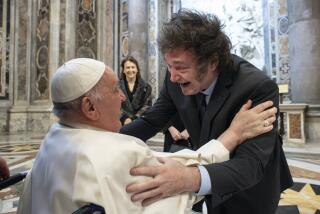Pope to Beatify Controversial Spanish Priest
VATICAN CITY — Saints are the icons of their church, but there will be acrimony as well as reverence Sunday when Pope John Paul II beatifies a controversial Spanish priest in what opponents call a rush to judgment.
In perhaps the most contentious beatification in modern times, John Paul will honor Msgr. Josemaria Escriva de Balaguer, founder of the disciplined, ultraconservative Roman Catholic organization Opus Dei. Beatification will leave the Blessed Escriva one step short of sainthood.
Escriva’s personality, the nature and goals of the secretive organization he created and the speed with which his cause has whizzed through the Vatican bureaucracy have all come under public attack.
Opus Dei expects about 120,000 worshipers in St. Peter’s Square--about 2,000 of them Americans--for the opening of five days of ceremony to salute Escriva, the leader of a mostly lay organization whose clout at the Vatican far exceeds its worldwide membership of 75,000, including 1,500 priests.
If Escriva and Opus Dei--Latin for Work of God--inspire awe and outrage within the church, the Pope’s own views are plain. He likes saints, having named more than any of his predecessors in the 20th Century. And he likes Opus Dei, applauding its Catholic militancy, welcoming its unquestioning loyalty to him and naming its members to key church posts.
“How can the cause of somebody as controversial as Escriva be rammed through so quickly? The answer is that the Pope wants it. There is no other group in the church that can help him get so much done,” an Italian theologian said.
He fears John Paul errs in advancing Escriva’s cause so soon after the Spaniard’s 1975 death.
Saints normally are proclaimed decades, even centuries, after their lifetime. The traditional route to sainthood distinguishes between martyrs who die in defense of Christian faith or morals and those who display requisite virtues--especially faith, hope and charity--to an exceptional or heroic degree. Intense investigations ensue, and there usually must be “divine signs” of miracles received in response to prayers addressed to the candidate.
Opus Dei, whose members seek to spread the Catholic message through their professional activities, is strongest in Spain and Italy, say spokesmen for the group here. In the United States, there are 3,000 or so Opus members and 54 Opus priests, said William A. Schmitt, the organization’s spokesman in New York.
Sensitive to criticism that has been particularly strong in Spain and Italy, the Vatican in recent weeks has officially forbidden some critics in the church to speak publicly about the Escriva case, one of them said.
“Without doubt this cause is controversial. But according to me, these are invented controversies,” said Father Flavio Capucci, the Opus priest who assembled the 6,000-page report supporting Escriva’s candidacy for sainthood.
Critics range from church members chary of fundamentalism to disaffected former Opus Dei members who knew Escriva, to Kenneth L. Woodward, religion editor of Newsweek magazine and author of a book on saint-making.
In a highly unusual, 10-page statement issued last week in obvious response to the protest against Escriva, who died at age 73, the Vatican stoutly defended its decision to honor him. Cardinal Angelo Felici, who heads the Congregation for the Causes of Saints, called criticism of the beatification “devoid of any foundation.”
Felici said the Pope had appointed a special commission to decide whether to proceed with the beatification. “After mature reflection, the commission gave the Holy Father their favorable opinion,” Felici said.
Founding the organization in 1928 in Spain, Escriva dedicated it to an ideal of sanctity in everyday life. It is strong among professional men and women, in fields such as teaching, banking, medicine, law, communications and politics. Five ministers in the Spanish government of Gen. Francisco Franco at one point were Opus members, according to one British student of the movement.
With Escriva as its high-profile leader, Opus Dei grew into a powerful lay organization that counts members in 80 countries. Most members marry in the context of a fruitful Christian life. But 10,000 or so senior members, called Numeraries, vow celibacy, as well as other Christian virtues such as poverty, chastity and obedience. They live communally in sexually segregated residences, contributing income earned at everyday jobs to the organization. Some, like Escriva himself, may practice self-flagellation, or wear a barbed ring around the thigh for up to two hours a day.
Disliked and distrusted by liberals and many non-integrationists in the church, Opus is often accused of power mongering and of accumulating and manipulating wealth and influence behind a shadowy curtain of secrecy.
Members normally do not announce their allegiance to a movement that controls their lives. In some countries, Opus has also been accused of brainwashing young recruits with religious indoctrination.
Opus denies all such accusations. “People think that to take faith seriously you have to be involved in church-y things. Money, power, influence. . . . That’s not our game. Our thing is the spiritual message,” Schmitt said. “We represent something new. Our call is to be in the world and to be totally dedicated to God--totally free and secular.”
Escriva’s followers, who call him “The Father,” believe he was divinely inspired and that the testimony of 92 witnesses called by Vatican investigators eloquently demonstrate his holiness.
His militant philosophy produced “The Way,” a collection of 999 maxims that is distributed by Opus in 39 languages. Maxim No. 1 says: “With your apostolic life, wipe out the trail of filth and slime left by the corrupt sowers of hatred. And set aflame all the ways of the earth with the fire of Christ that you bear in your heart.”
The saintly portrait of their founder painted by Opus Dei members is vouchsafed by critics, including some former Opus Dei members. But they also say that Escriva was arrogant, elitist, bad-tempered and intolerant. The real man, they charge, has been obscured since his death to suit the personality cult that has sprung up around him and to improve his chances for sainthood.
Opus Dei, which methodically challenges all criticisms of itself or its founder, says that the exhaustive Vatican study is, in Capucci’s words, “complete and definitive,” demonstrating conclusively that “there is proof of the heroic exercise of virtue.”
Some of Escriva’s critics charge that they were not heard by the Vatican tribunals assembling the case. Opus says anyone who asked to be heard was heard.
Woodward says that a definitive biography of a man who was controversial in Spain during his lifetime cannot be written only 15 years after his death. Many archives from Franco’s days have not yet been declassified, other naysayers note. Opus responds that “beatification does not intend to pass historical judgment on a person and his epoch.”
Never has a potential saint moved so fast along the track to such hallowed rank. The cause of one saint to be canonized later this year lay dormant for 200 years while the fire went out of the 17th Century controversy over his adoration of the Sacred Heart.
Woodward and others, some within the Vatican itself, say Opus Dei used its influence to get the cause approved with what one Spanish cardinal called “unseemly haste.” Nonsense, says Opus Dei, pointing to recent reforms that streamlined saint-making procedures.
After Escriva’s death, Opus Dei notes, 69 cardinals, 1,228 bishops, the superior generals of 41 religious orders and thousands of lay Catholics from around the world petitioned the Vatican to consider his beatification and canonization. The ensuing 10-year investigation, Opus quotes the Vatican’s chief saint-maker as saying, “has been one of the most rigorous and scientifically in-depth in the history of the church.”
Escriva’s Career
Josemaria Escriva de Balaguer was born in Barbastro, Spain, on Jan. 9, 1902 . . . began seminary studies in 1918 . . . by 1922 was superior in his seminary in Zaragoza, where he took final vows in March, 1925 . . . began university studies in civil law, did pastoral work, moving to Madrid in 1927 where he worked among the poor and terminally sick in slums . . . continued academic studies for civil law doctorate at Madrid university . . . on Oct. 2, 1928, founded Opus Dei, which in February, 1930, opened its ranks to women . . . during Spanish Civil War continued pastoral work, often at great danger, in Madrid and Burgos . . . outlined precepts in “The Way,” which appeared in 1939 and was first of nine of his religious works . . . founded the Priestly Society of the Holy Cross in 1943 . . . moved in 1946 to Rome, where he stayed until his death . . . saw his movement receive papal seal of approval in 1950 and expand globally during 1950s and 1960s . . . was grand chancellor in 1960, when University of Navarre in Spain was founded (the first of four Opus Dei universities) . . . died in 1975.
More to Read
Sign up for Essential California
The most important California stories and recommendations in your inbox every morning.
You may occasionally receive promotional content from the Los Angeles Times.










